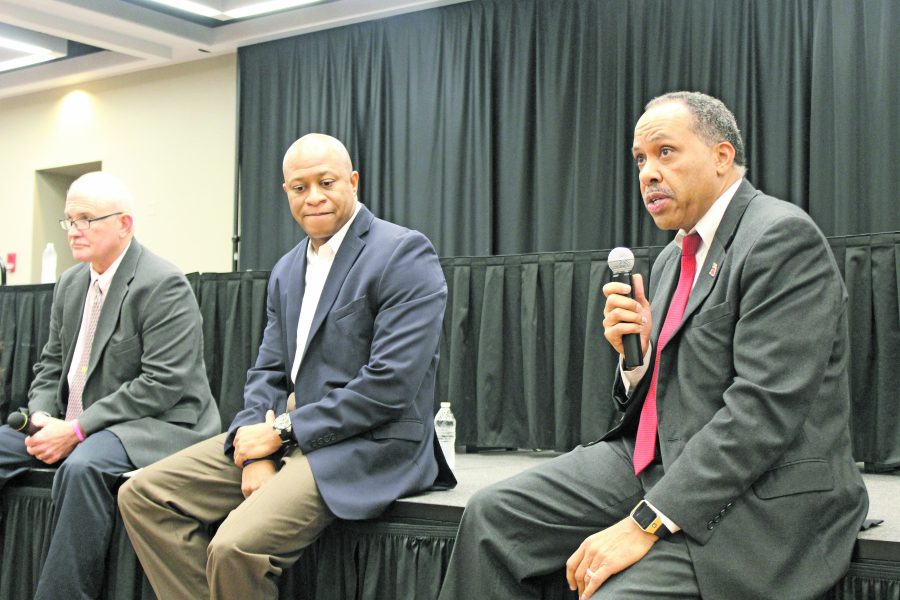The University of Alabama National Society of Black Engineers hosted a town hall meeting in the ballroom of the Ferguson Center titled “Race, Policy, and Ethics,” which focused on race relations between UA Staff, police and black students.
The NSBE moderated the event last Thursday and asked questions for the panel made up of two UA students, a UA professor and three officers from UAPD and TPD. NBSE said that this was not a rally for Black Lives Matter, but rather a place to discuss and address a serious problem with many moving parts.
Discussion started with audience members being asked if they felt they have been discriminated against by the University before, with the majority raising their hands yes. Panelists were then asked about their own experiences with racism and about their opinions on race relations in general.
“I’m happy to be here to get my education,” panelist and student Areba Walker said. “I sometimes do receive dirty looks from my fellow students, but I don’t let it bother me.”
Another panelist and student, Fitzgerald Mosley, described his personal experience with racism during a peaceful protest where he was told, “all they do is march and complain.”
All of the police officers were in agreement that better forms of communication needed to be established and noted that improvement would facilitate better relations.
“Everyone in this room has a bias,” said Steven Anderson, Tuscaloosa police chief. “We have to be able to open up a dialogue so we can talk about these issues.”
Another recommendation the officers made to improve student-law enforcement relations was the “ride-along,” where students could ride with an officer for a few hours and see situations from their perspective.
Mosley was also an advocate of the ride-alongs and said they are an effective way to give students a real view of the lives of UAPD officers.
One problem the town hall addressed was the subject of police officers being trained on how to act around citizens, but the people have no idea how they are supposed to act around the police in these situations.
“I don’t want anyone to be afraid of police officers,” Anderson said. “What good does it do for us to have training, but the people we are supposed to protect are not educated with how to react to us appropriately?”
NSBE members and the panelists also focused on how African Americans on campus could be better included at the University. Utz McKnight, a political science professor who has devoted most of his studies towards race relations, believes this starts with accountability.
“Press your white friends on how they feel about what is going on,” McKnight said to the audience. “It is very difficult but very important.”
Mosley agreed that accountability is needed for anything to change.
“We need to all respect ourselves before we demand respect,” Mosley said. “That is the only thing I would change about this campus.”
Other panelists agreed that too much of the blame is put on the individual and not enough is being put on the police officers.
“If I show up to my job and break the rules, I’m going to be fired,” Mosely said. “The good police need to hold the bad police accountable.”
Despite racial tensions, UAPD is open to any ideas that will lead to a more peaceful environment. Many officers have been with the University a long time, and they said their main goals are helping out the students.
“It is an ongoing process; it’s all about training and making them aware of the climate,” Anderson said. “It’s about going to meetings such as this and letting them know we are trying to break down these barriers.”









